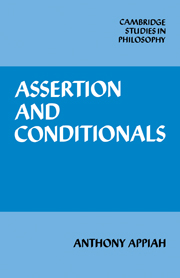Epilogue
Published online by Cambridge University Press: 07 October 2011
Summary
I have tried in this book to use the general account of the nature of belief, given in Part I, to ground an account of meaning, given in Part II; and to use the theory of meaning, and, in particular, the notion of assertibility that it entails, in Part III, to explain the semantics of some indicative conditionals. I have produced only a small part of the full theory of beliefs: nothing about second-order probabilities; little about the reference relation between singular representational elements and the world; mere intimations – promissory notes – about quantification. The account of meaning, too, needs developing: to deal with speech-acts other than assertion, for example, and, more generally, with conversational and conventional implicature. And there is much more to be said about conditionals: subjunctives, in particular. All these are matters well worth pursuing. And, I conjecture, the study of each of the unresolved problems in the theory of meaning will benefit, as I think the study of conditionals has, from an approach that begins with the nature of beliefs and moves out to the semantics of sentences that express them.
The main argument for the theory I have developed is that we need its features to do the job we do every day of explaining each other's action … including, of course, out utterances. I claim, in fact, that, except for a technical precisification and, no doubt, some errors of mine, it is your theory also.
- Type
- Chapter
- Information
- Assertion and Conditionals , pp. 253Publisher: Cambridge University PressPrint publication year: 1985



